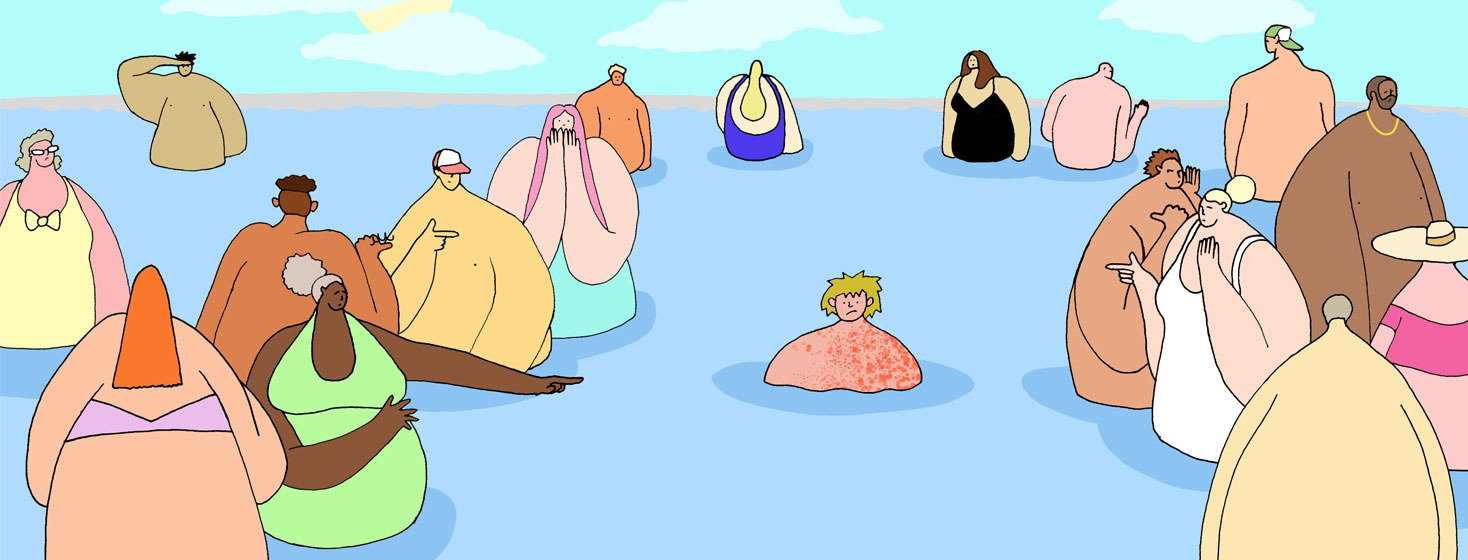Community Views: Embarrassing Moments with Psoriasis
Everyone has cringe-worthy moments when they want to disappear or crawl up into a ball. Those with psoriasis no doubt can point to some of those embarrassing kinds of moments.
Plaque psoriasis is an uncomfortable diagnosis to live with for several reasons. Not only is it physically uncomfortable and even painful, but it can also be emotionally draining to deal with reactions about your condition from other people.
The self-consciousness that comes with psoriasis
The emotional cost of psoriasis rivals the physical discomfort when considering the potential social stigma and challenges in relationships. To find out more about your experiences, we reached out to community members on the PlaquePsoriasis.com Facebook page.
We asked you to tell us: “Thanks to rude comments and painful stares, psoriasis can be embarrassing. Do you have an embarrassing moment with psoriasis that you would like to share?”
A handful of community members responded. Here is what was shared.
When others avoid physical contact
One of the most common responses from community members is that strangers avoid touching them. Instead of asking a question or trying to gain information, these people assume the skin condition they see is dangerous to them.
When we know others are avoiding us, it can be hard not to feel shame. It can be easy to feel guilty as if we have done something wrong. We can know on an intellectual level that having plaque psoriasis is not our fault – that we have done nothing wrong to deserve poor treatment from others. But it can take time to know this in our hearts and accept that other people’s reactions to us have nothing to do with us.
“Whenever a customer catches sight of my hands and puts down the money they were about to hand to me and slides it across the counter.”
When friends act like it is contagious
Unfortunately, many people in the plaque psoriasis community have faced situations where other people assume this skin condition is contagious. Even worse, several of you shared that you have friends and acquaintances who have been told that plaque psoriasis is not contagious but they still act as if it is. This type of reaction can be especially hurtful.
“I was asked if it was contagious.”
“My husband’s friends refused to touch my hands because I MIGHT be contagious. This is super hurtful as we had explained that it was not.”
When people ask nonstop questions
It can be incredibly overwhelming and tiring to be peppered with question after question about your plaque psoriasis. In some situations, the questions stop centering on learning about the diagnosis and become more about the asker’s curiosity. This can cause you to feel more like an oddity than a person, which is unsettling and unfair.
“Why are you always wearing a turtleneck or sweatshirt in the summer? Is it not too hot for that?”
“When I lost about 70% of my hair and lots of flairs, a coworker asked if I had cancer.”
“One of my cousins was yelling at a family reunion, asking what happened to my face. This person said it looked like I got burned with hot grease. Another time, at a community dinner, someone who knows me was asking if I was burned in a fire.”
When strangers harass
What can be worse than the questions is when strangers harass or try to get you removed from a space simply because they feel uncomfortable. This is an extreme reaction, but it has happened to some of you.
Hearing about these incidents can be a good reminder that you have as much right to be anywhere as anyone else. It can also be a reminder that there will always be unkind people in the world, and we have a choice in how we respond to them. It can help to remember their actions are a reflection of who they are and have nothing to do with us.
“This lady and her daughter followed me from one side to the other of a pool at a water park, and she was on the phone. I told my mom that I felt like this lady and her daughter was following us. Next thing I know, a manager came and said, ‘I am so sorry, and I do not want to embarrass you or upset you, but we have a complaint of you having ringworm. I suspect it may be psoriasis.’ I said, ‘Yes, I have psoriasis.’ He said, 'OK, and I am so sorry once again.’
I saw the lady and her family leave immediately after he came to me. I was ready to go up to her and ask her why could she not ask me instead of embarrassing me and make me look like I am in trouble in front of my kids and everyone else there?”
Finding strength and resilency
We want to say thank you to everyone who shared. We appreciate you opening up about this topic to help let others know they are not alone in dealing with this huge and disappointing stigma. Our community is always here to listen, support, and provide the right kind of resources.
In addition to condition management, social situations and embarrassing moments are an added concern and can have a heavy impact. We hope that you've found resiliency in sharing.

Join the conversation